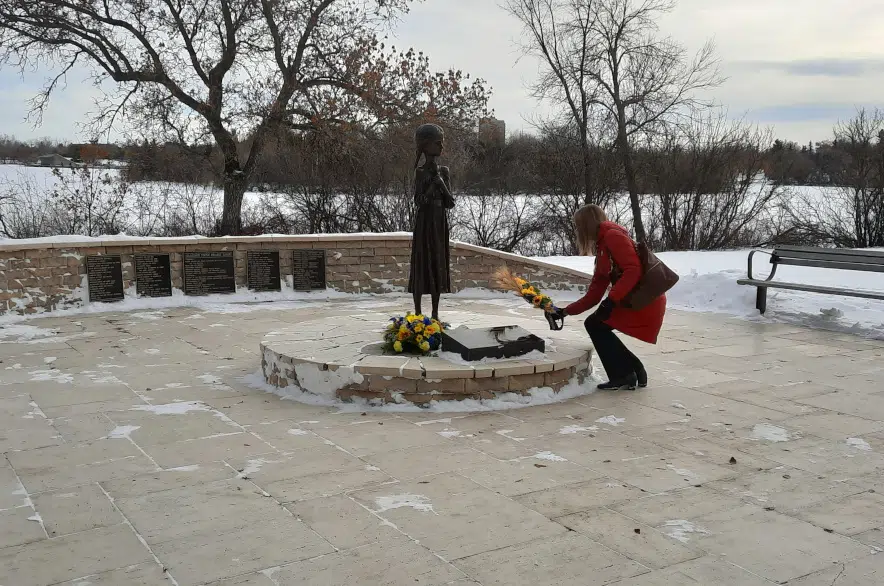MLAs along with Ukrainians and members of the public gathered at the Saskatchewan Legislature on Tuesday afternoon to remember the tragic event that was the Holodomor.
The Holodomor took place from 1932 to ’33 and saw millions of Ukrainians die while working under Soviet management of agricultural crop production in their region.
Legislative Secretary responsible for Saskatchewan-Ukraine Relations Terry Denis spoke at the event Tuesday and said the province will continue to remember those who were lost in the deadly events.
“We remember the millions of people who died and the millions who suffered and survived. This atrocity must not be forgotten and will not be forgotten,” he stated. “This act of remembrance is our burden and our duty. It is, however, a burden we’ll never refuse and a duty we’ll never fulfil.”
In 2015, a monument called “Bitter Memories of Childhood” was erected in Wascana Centre to remember those lost from what is one of the deadliest events in human history.
One-third of the people who died in the Holodomor were children, according to Dennis.
Ninety years after that tragic event, Russia is continuing to attempt to punish Ukrainians for their identity, but Dennis says Ukrainians are stronger and more untied than ever.
“The Ukrainian people are teaching their oppressors again what strength really is,” Dennis said. “They’re showing the world the true meaning of resilience and endurance. They’re reminding us of what it means to be human by resisting and inspiring us to help however we can.”
Elana Kruger with the Ukrainian Canadian Congress (UCC) spoke at Tuesday’s event and says it’s sad to see a similar event taking place in Ukraine almost 90 years after the Holodomor.
“Sadly, we see the actions from 90 years ago repeated, as grain from the breadbasket of Europe is being kept from those who need it,” she said. “In continuing to block Ukraine’s ports and attacking Ukraine’s agricultural infrastructure, the Russian Federation’s use of food as a weapon threatens the world’s economic stability, contributes to sharp increases in prices and instigates hunger.
“Global food security is a fundamental human right, yet Russia’s war in Ukraine denies this fundamental human right to the rest of the world,” Kruger continued. “This is why it’s important to remember those who died in the Holodomor, honour the descendants of the survivors and honour the truth tellers. The truth can no longer be concealed or facts denied. Millions starved to death in a man made famine.”
Kruger added that Ukrainians to this day are continuing to back down and fight to keep their identity.
Anastasiia Vasylieva moved to Saskatchewan from Ukraine just months ago and spoke at the Legislature.
She felt it was important to remember the tragic event from the 1930s, as well as tell government officials what she experienced first hand before fleeing to the province.
“It’s very important for me to actually tell what is happening over there,” she said via a translator.
“I came here in the middle of summer four months ago. We came here on our own by plane. It’s very important to remember this day and understand that (Russia) did this to us 90 years ago and they’re still doing it to us now a days,” she added.
Her speech at the Legislature comes as Saskatchewan gets set to welcome 230 more displaced Ukrainians in Saskatoon on Wednesday.
It’s the fourth flight of Ukrainians to arrive in the province since the war began in February.











